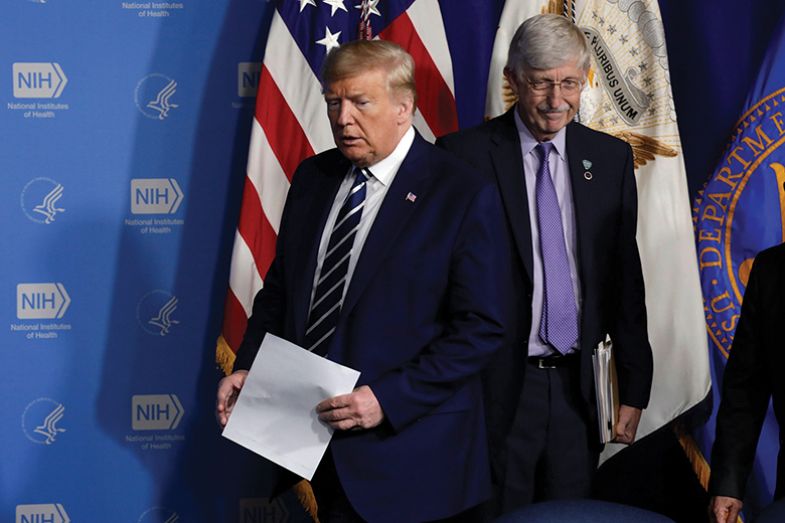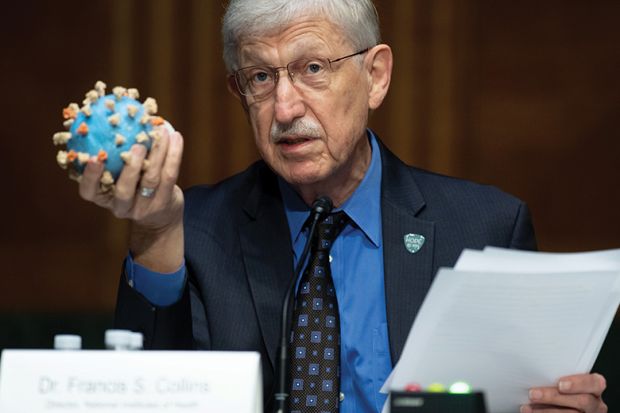As Francis Collins leaves the US National Institutes of Health directorship after a record 12 years, it’s widely agreed that on many levels there is not likely to be anyone like him again.
The question, instead, is what traits expressed by the world-class physician-geneticist with the astoundingly astute political touch are worth keeping in the NIH germ line.
For universities, one clear answer involves money. From his appointment in 2009, through presidencies and congressional majorities of both parties, Dr Collins’ folksy and low-controversy style helped the NIH budget – the top source of federal research dollars in higher education – grow 38 per cent to more than $41 billion (£31 billion).
His performance was especially remarkable during the four years of the Trump administration, where he stood virtually alone among top Obama-era appointees, faulted by some academics for giving legitimacy to an administration of anti-science racial bigotry, yet holding the line against even greater national calamity under a president resistant to meeting the public health demands of the Covid pandemic.
But now, with his retirement as director set for this month, and the academic community looking ahead to new NIH leadership, some concerns from the Collins tenure that have been sitting more in the background – perhaps in respectful deference to a generational champion – are starting to get a fuller airing.
Chief among them are shortfalls in confronting racial inequities in academic science, in finding the optimal balance between protecting national security and promoting global scientific exchange, and in charting a new role for the NIH in ensuring public health beyond its traditional focus on drugs and devices.
In an interview ahead of his year-end departure as director, Dr Collins acknowledged the need for more progress in some of those areas, and less so in others.
The renowned genetic scientist was especially adamant in defending the NIH’s extensive role in the Trump administration’s widely criticised crackdown on scientists with ties to China. More than 150 defendants, overwhelmingly people of Chinese heritage, have been charged in the cases. But the complaints against them mostly consisted of alleged paperwork violations that often got dismissed in court processes, with no allegations of actual espionage, after severely disrupting lives and careers.

For that, Dr Collins said the government was fundamentally on the right path, despite the pain it had caused some people. While the alleged violators may not be spies, the investigations did reveal “many horror stories” of scientists receiving money from both the NIH and foreign sources for the same research work, he said.
And in particular cases such as that of Anming Hu – the tenured professor and nanotechnology expert at the University of Tennessee at Knoxville who was arrested and fired, only to have his prosecution thrown out by a federal judge as baseless – Dr Collins rejected any sense of systematic mistreatment.
“That may be the way in which some are portraying it,” he told Times Higher Education. “I think we are trying to do our job, when we see evidence that there is a problem, to actually look into it. And it’s not just about one country, although to be honest, most of the cases that have been uncovered have been people who had Chinese origins.”
Dr Collins was contrite, however, about the NIH’s struggles to improve racial equity in academic science. “I worked pretty hard on that,” he said, including hiring the NIH’s first chief officer for scientific workforce diversity, and creating grant programmes that should offer long-term help to people from non-traditional backgrounds. Still, large race-based gaps in NIH grant awards have held firm. “I guess I needed to be realistic that this is a problem that’s been in the works for decades or maybe centuries, and so it’s going to be a hard one,” Dr Collins reflected. “I wish I’d gotten a little further.”
Dr Collins announced in October that he wanted to step down, having reached a point of clear progress against Covid, and appealed for the Biden administration to find a female scientist to replace him. The former head of the Human Genome Project, which in 2000 finished a decade-long quest to identify and map all 20,000 human genes, said that he would stay at NIH to concentrate on his lab work at the National Human Genome Research Institute. He leaves as the longest-tenured director since the position became a presidential appointment in 1971.
In his interview, Dr Collins admitted that he had misjudged the degree to which Covid would remain a problem of human behaviour long after scientists discovered a vaccine against the disease. Yet he’s been hesitant to sketch out a future for the agency – whose motto is “Turning Discovery Into Health” – that more directly and aggressively promotes human well-being outside of finding cures for diseases.
Asked about the role of academic research in that holistic challenge, Dr Collins acknowledged that funding for schools of public health remains “woefully inadequate” and that the deficiency “deserves a close look”. He also suggested paying even more attention to health-related disparities across society, and spoke of improving NIH coordination with governmental health agencies.
But the NIH’s mission centres on basic science and clinical applications, he said. “We’re not in a position really to revise the healthcare system,” he said.
POSTSCRIPT:
Print headline: Is Collins leaving a healthy NIH?
Register to continue
Why register?
- Registration is free and only takes a moment
- Once registered, you can read 3 articles a month
- Sign up for our newsletter
Subscribe
Or subscribe for unlimited access to:
- Unlimited access to news, views, insights & reviews
- Digital editions
- Digital access to THE’s university and college rankings analysis
Already registered or a current subscriber? Login








